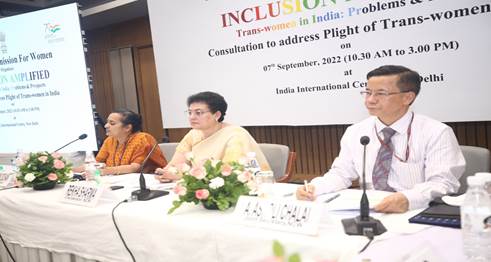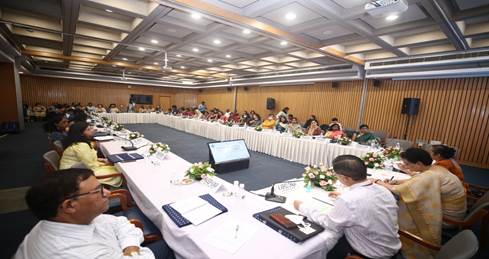
The National Commission for Women organized its first-ever Consultation for transwomen; ‘Inclusion Amplified, Transwomen in India: Problems & Prospects’ to address the misconceptions leading to stigma attached with the individuals of the community and spark a conversation with regard to their acceptance and participation in the society.
Through this Consultation, the Commission sought to offer a broad platform to academicians, researchers, social activists, policy makers, civil society members, and trans-women themselves to analyze problems which they face in various arenas and to discuss future directions and policy proposals for the welfare of trans-women.
Ms Rekha Sharma, Chairperson, National Commission for Women, Ms Meeta Rajivlochan, Member Secretary, NCW, Ms Radhika Chakravarthy, Joint Secretary, Ministry of Social Justice and Empowerment, Shri Asholi Chalai, Joint Secretary, NCW and senior officials of the Commission graced the occasion. Stakeholders and representatives from organizations working for the trans-women community, officials from police, NALSA, DLSA and individuals identifying themselves as trans-women participated in the Consultation. Some of the organisations that joined today’s deliberation were Sahodari Foundation, Humsafar Trust, Mahila Jagrut Sevabhavi Sanstha, Trans Care India, NAZ Foundation, Udaan Trust, Alliance India, etc.

In her inaugural address, Chairperson Ms Rekha Sharma said that there are many challenges that a transwoman faces in their families and in the society. “This Consultation is to know more about the problems and challenges faced by the community members. The Constitution gives every citizen the right to live a life of dignity and we have to collectively work towards achieving equality for all. The Commission has been taking up complaints from transwomen and through this Consultation we want to shape the roadmap for redressal of problems faced by them,” said Ms Sharma.

In her address, Ms Radhika Chakravarthy, Joint Secretary, Ministry of Social Justice and Empowerment said that the national portal for Transgender persons provides end to end facilities for availing benefits of government schemes launched for the community and only a self disclosed identity document is the requisite condition in this regard. She also spoke about the Garima Greh scheme of the government which aims to provide basic amenities like shelter, food, medical care and recreational facilities for transgender persons.
The panelists appreciated the work being done by the Ministry of Social Justice and Empowerment for the welfare of transwomen and transgender persons. The panelists stressed on the need to sensitize the masses on priority and to develop a counseling mechanism for Trangender persons in schools and educational institutes. The experts also recommended that the parents and families of transwomen be counseled not to abandon their children, give them access to property rights, and to create awareness program for sensitizing trans-women about their legal rights.
Additionally, the experts appreciated the bringing about of the Transgender Persons (Protection of Rights) Act, 2019 and stressed on the need for proper implementation of the Act. They also recommended the need to have skill building workshop for transwomen, medical and social protection schemes, access to insurance, introducing an inclusive curriculum in schools for sensitizing students and teachers as the school dropout numbers among the transgender persons is very high, setting up a national helpline for addressing problems of transwomen, among other suggestions and recommendations.
***
SS/RKM



